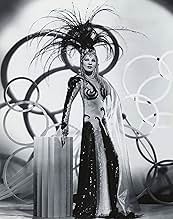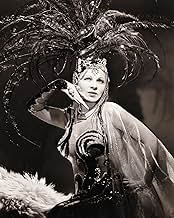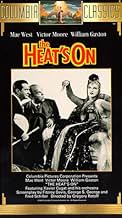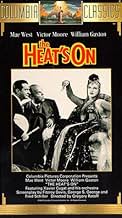अपनी भाषा में प्लॉट जोड़ेंWhen his biggest star joins a rival's show, a Broadway producer bluffs and schemes to get her back.When his biggest star joins a rival's show, a Broadway producer bluffs and schemes to get her back.When his biggest star joins a rival's show, a Broadway producer bluffs and schemes to get her back.
Leon Belasco
- Shore - the Agent
- (बिना क्रेडिट के)
Beatrice Blinn
- Babette
- (बिना क्रेडिट के)
फ़ीचर्ड समीक्षाएं
Turner Classic Movies just unearthed this turkey from their vaults and, being a fan of Mae West (though not an avid one), I thought I'd give it a whirl. Big mistake! (i.e., Big disaster!) After it had unspooled, TCM's host, Robert Osborne, revealed that producer-director Gregory Ratoff had somehow obtained Mae's signature on a contract to appear in this film without her seeing a completed script. When she did get an astonished look at what she was supposed to headline, she was "furious" according to Osborne, and promptly went to work rewriting most of her scenes, adding a few (but not enough) of her trademark witticisms.
The story is more than silly and takes little advantage of Miss West's star power, and, except for Hazel Scott's interpolated production numbers, there's almost no one else in the cast to match Mae's wattage. But she looks great, slinking around in Walter Plunkett's fancifully fantastic creations and Franz Planer's glossy black-and-white cinematography makes the most of the second-tier production values typical of a Columbia Pictures programmer.
Poor Victor Moore is required to portray a pathetic boob, intimidated by a battleaxe of a sister, quite effectively embodied by one Almira Sessions. The ingénue, played by Mary Roche, probably didn't elicit many wolf whistles when this dud was shown to the troops during WW II; Lloyd Bridges has a really small role as her swain (in uniform, of course); and there's an actor named Lester Allen, playing a character appropriately called Mouse Beller, who could only be cast in a role with that moniker.
Mae West quit performing before the cameras (going back to the stage and touring with her fabled nightclub act) and didn't make another picture until "Myra Breckenridge" in 1970 (and she was arguably the best thing in that crazy curiosity). This one is only for those fans who want to get a look at what Hollywood thought it could get away with during the wartime years.
The story is more than silly and takes little advantage of Miss West's star power, and, except for Hazel Scott's interpolated production numbers, there's almost no one else in the cast to match Mae's wattage. But she looks great, slinking around in Walter Plunkett's fancifully fantastic creations and Franz Planer's glossy black-and-white cinematography makes the most of the second-tier production values typical of a Columbia Pictures programmer.
Poor Victor Moore is required to portray a pathetic boob, intimidated by a battleaxe of a sister, quite effectively embodied by one Almira Sessions. The ingénue, played by Mary Roche, probably didn't elicit many wolf whistles when this dud was shown to the troops during WW II; Lloyd Bridges has a really small role as her swain (in uniform, of course); and there's an actor named Lester Allen, playing a character appropriately called Mouse Beller, who could only be cast in a role with that moniker.
Mae West quit performing before the cameras (going back to the stage and touring with her fabled nightclub act) and didn't make another picture until "Myra Breckenridge" in 1970 (and she was arguably the best thing in that crazy curiosity). This one is only for those fans who want to get a look at what Hollywood thought it could get away with during the wartime years.
It took three credited screenwriters to come up with this flaccid comedy-musical from Columbia--and not one of them apparently had a sense of humor. Perhaps taking a page from Mae West's real-life tangles with the censors, the bawdy, naughty comedienne is toned way down here in a plot about a musical stage performer who finds herself stuck in a bomb and blames her manager; he gets a bright idea and has the show raided for indecency to drum up business, but the gag goes too far and the show is closed for good. At this point, the foolish scenarists practically lose track of Mae, which is the most indecent thing about the picture! She pops up intermittently, talking on the phone or sitting idly in the theater, but all her charm and smarm has been extinguished (she retired from films for twenty-seven years after this). The manager weasels show money out of a good-natured schnook and puts on a new revue (a nice wholesome one)--and even gets West back in the spotlight--but it's too late. The movie has collapsed around everyone like an exhausted house of cards. *1/2 from ****
At 49, Mae West appeared in this bagatelle produced and directed by her friend, Gregory Ratoff, who needed a name actor to justify the production, but the main character is a hapless bumpkin, well played by Victor Young. Nearly three decades passed before she appeared in another movie. Even more odd was the brief career, as an actress, of pretty, charming Mary Roche, who played Young's niece, although she went on to work as a hair stylist on eight features, three of them very important ones, beginning with "On the Waterfront" (1954). This story of an attempt to put on a Broadway show goes in one ear and out the other, except for Xavier Cugat and his orchestra and the amazing piano playing of Hazel Scott, who even plays two pianos at once.
I'm a big fan of Mae West, and I waited for years to see this insignificant, forgettable little movie. Although I knew it had gotten bad reviews at the time of its release--- and West herself didn't like it any more than the critics did--- I thought there still might be something in it worth seeing, since it holds such an important place in her career: this was the final movie of her 1930s/1940s "movie star" period. After it was done, West returned to live stage work, recording sessions, and of course her famous nightclub act of the 1950s. She was not to make another film for 27 years (at which time she did the rather infamous "Myra Breckinredge" in 1970).
Seeing "The Heat's On" is an exercise in tedium. I had to literally struggle to stay awake during it. It's not that it's all that horrendously "bad"--- heck, even bad movies can be entertaining for the wrong reasons. This one is just....empty. Completely vapid and forgettable. It's easy to understand why Mae West practically disowned this movie.
The main thing wrong with it is that she isn't in it nearly enough. For the entire first hour, I swear that West had about 6 minutes of total screen time, scattered throughout in a series of VERY short "blink and you'll miss it" scenes. She's got more charisma and screen presence, by far, than anybody else in this thing--- when she's on, you can't take your eyes off her. But you hardly get to see her! Giving West more screen time would have improved this movie immensely, and it's a mystery to me why director Gregory Ratoff didn't understand that.
What makes her absence from the screen even more frustrating, if not downright puzzling, is that so much of this movie is a revue/type *musical* (in neon lights), the type of film that could have shown her at her absolute best. But instead you get one lame song after the other filling the screen; there are singers, dancers, production numbers, showgirls, Latin-flavored guitarists, even a boogie-woogie pianist/singer (blues and jazz great Hazel Scott, playing herself). They all come in, do their thing, leave, and it's on to the next song. With the singular exception of Scott, who is wonderful--- all of this is absolutely and completely forgettable. Most of the singers, the dancers, the songs, the movie itself: it's "B"-grade material at best. We aren't talking MGM-quality here, folks.
Watching this parade of musical mediocrities go by, all you can think of the entire time is "Where IS Mae West??! Why don't they bring her on?" But it never happens until the very end, at which time you'll be practically asleep if you've managed to sit through it all up to that point. It's hard to imagine who might be a fan of this picture.
For what it's worth, West does look pretty good. Always proud of her youthful appearance, she was 50 years old here, but she looks maybe 40-ish, and she's dressed in stylish, contemporary clothes for one of the very few times in her screen career. (Well, except for her very first musical number, in which--- amusingly--- she's in her trademark "gay 90s" garb, looking much like she did in her earlier films).
The story--- what flimsy plot there is of it--- has something to do with Broadway musical star Fay Lawrence (West) getting funding for her next show, and having producers fight over her. But the main point of this movie, and the most amount of screen time, is devoted to the endlessly boring musical numbers. Gentle, befuddled Victor Moore is the primary male lead; and a YOUNG Lloyd Bridges--- yes, he was young once!--- has a featured part as a soldier engaged to Moore's niece.
Not a bad movie, just a boring one, and it missed the boat all around. Mae West deserved better.
Seeing "The Heat's On" is an exercise in tedium. I had to literally struggle to stay awake during it. It's not that it's all that horrendously "bad"--- heck, even bad movies can be entertaining for the wrong reasons. This one is just....empty. Completely vapid and forgettable. It's easy to understand why Mae West practically disowned this movie.
The main thing wrong with it is that she isn't in it nearly enough. For the entire first hour, I swear that West had about 6 minutes of total screen time, scattered throughout in a series of VERY short "blink and you'll miss it" scenes. She's got more charisma and screen presence, by far, than anybody else in this thing--- when she's on, you can't take your eyes off her. But you hardly get to see her! Giving West more screen time would have improved this movie immensely, and it's a mystery to me why director Gregory Ratoff didn't understand that.
What makes her absence from the screen even more frustrating, if not downright puzzling, is that so much of this movie is a revue/type *musical* (in neon lights), the type of film that could have shown her at her absolute best. But instead you get one lame song after the other filling the screen; there are singers, dancers, production numbers, showgirls, Latin-flavored guitarists, even a boogie-woogie pianist/singer (blues and jazz great Hazel Scott, playing herself). They all come in, do their thing, leave, and it's on to the next song. With the singular exception of Scott, who is wonderful--- all of this is absolutely and completely forgettable. Most of the singers, the dancers, the songs, the movie itself: it's "B"-grade material at best. We aren't talking MGM-quality here, folks.
Watching this parade of musical mediocrities go by, all you can think of the entire time is "Where IS Mae West??! Why don't they bring her on?" But it never happens until the very end, at which time you'll be practically asleep if you've managed to sit through it all up to that point. It's hard to imagine who might be a fan of this picture.
For what it's worth, West does look pretty good. Always proud of her youthful appearance, she was 50 years old here, but she looks maybe 40-ish, and she's dressed in stylish, contemporary clothes for one of the very few times in her screen career. (Well, except for her very first musical number, in which--- amusingly--- she's in her trademark "gay 90s" garb, looking much like she did in her earlier films).
The story--- what flimsy plot there is of it--- has something to do with Broadway musical star Fay Lawrence (West) getting funding for her next show, and having producers fight over her. But the main point of this movie, and the most amount of screen time, is devoted to the endlessly boring musical numbers. Gentle, befuddled Victor Moore is the primary male lead; and a YOUNG Lloyd Bridges--- yes, he was young once!--- has a featured part as a soldier engaged to Moore's niece.
Not a bad movie, just a boring one, and it missed the boat all around. Mae West deserved better.
This mild little film is like untold dozens of minor musicals from the 1940's that were ground out by Columbia and Universal and pretty much forgotten and unseen since original release. What keeps this one in circulation is the fact that it top lines no less than Mae West, one of the cinema's greatest women stars. West was now on the eve of 50 when the movie was made, a good 20 years and then some older than most of the pinup girls that were packing in the moviegoers of the era. Presumably her limited options in Hollywood at the time persuaded to take a chance on this Gregory Ratkoff production. She took the project seriously enough to slim down, looking sensational in some gorgeous Walter Plunkett gowns and clearly spiced up some of her scenes with some uncredited but unmistakable original wisecracks. Alas, far too much time is given to musical numbers by other performers although glamorous black jazz artist Hazel Scott is fantastic in her productions. There is also perhaps a bit too much time given to the male leads, William Gaxton and Victor Moore, highly regarded Broadway stars of the era (co-stars in fact in four stage hits) but not actors who can carry a film. Even though the cast is talented and some of the musical numbers are quite good (I actually enjoyed Moore's comic number "They Never Look as Pretty as the Package"), you keep waiting for Mae West to appear on the scene again. I suspect this was true even in 1943 when her popularity was at a low point.
Mae West nevertheless manages to score some wonderful moments, notably the comic scene when Victor Moore comes up to see her sometime. Almost as good is West's confrontational scene with Moore's blue nose sister, character actress Almira Sessions. (It's interesting to note the film is one of the few times West is surrounded by performers older than herself, Gaxton, Sessions, and Moore have several years on her which may be part of the reason West looks fairly youthful in the movie in addition to being well-preserved). Starlet Mary Roche is featured as Moore's niece who longs for a show business career, her one musical number "Walbash" is actually quite pleasant but this is apparently her only film appearance, she later became a hairdresser in the film industry if that is indeed the same Mary Roche.
Some like it hot and this movie ain't so hot but we have so few Mae West movies to enjoy it is to be cherished in a way for another glimpse at one of America's great pop culture phenomenons.
Mae West nevertheless manages to score some wonderful moments, notably the comic scene when Victor Moore comes up to see her sometime. Almost as good is West's confrontational scene with Moore's blue nose sister, character actress Almira Sessions. (It's interesting to note the film is one of the few times West is surrounded by performers older than herself, Gaxton, Sessions, and Moore have several years on her which may be part of the reason West looks fairly youthful in the movie in addition to being well-preserved). Starlet Mary Roche is featured as Moore's niece who longs for a show business career, her one musical number "Walbash" is actually quite pleasant but this is apparently her only film appearance, she later became a hairdresser in the film industry if that is indeed the same Mary Roche.
Some like it hot and this movie ain't so hot but we have so few Mae West movies to enjoy it is to be cherished in a way for another glimpse at one of America's great pop culture phenomenons.
क्या आपको पता है
- ट्रिवियाThis was Mae West's final film until Myra Breckinridge (1970) 27 years later.
- गूफ़On a wall of a producer's office is a presumably old publicity shot of Fay wearing an elaborate headdress that she doesn't actually wear until she performs a musical number later in film for an entirely new production staged by rival producer.
- भाव
Fay Lawrence: [singing] If you want things put in order, Come and see me south of the border...
- साउंडट्रैकI'm Just a Stranger in Town
(1943)
Music by Jay Gorney
Lyrics by Henry Myers and Edward Eliscu
Copyright 1944 by Mills Music Inc.
Performed by Mae West (uncredited) in the show "Indiscretions"
टॉप पसंद
रेटिंग देने के लिए साइन-इन करें और वैयक्तिकृत सुझावों के लिए वॉचलिस्ट करें
विवरण
- रिलीज़ की तारीख़
- कंट्री ऑफ़ ओरिजिन
- भाषाएं
- इस रूप में भी जाना जाता है
- Sinfonías dislocadas
- उत्पादन कंपनी
- IMDbPro पर और कंपनी क्रेडिट देखें
- चलने की अवधि1 घंटा 19 मिनट
- रंग
- पक्ष अनुपात
- 1.37 : 1
इस पेज में योगदान दें
किसी बदलाव का सुझाव दें या अनुपलब्ध कॉन्टेंट जोड़ें




































